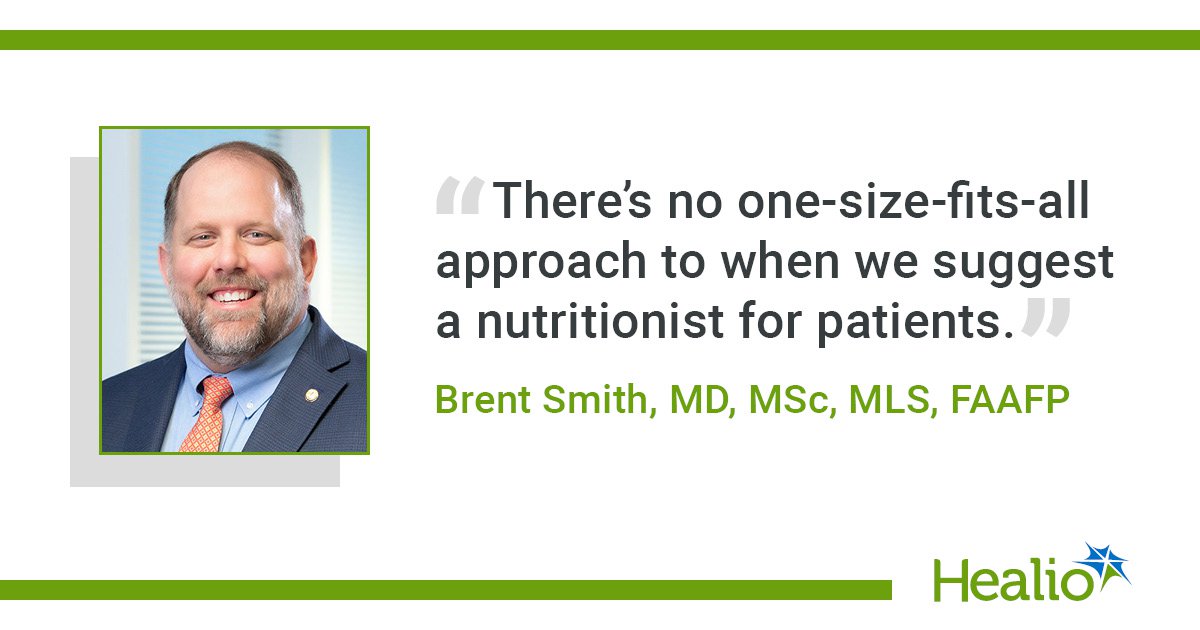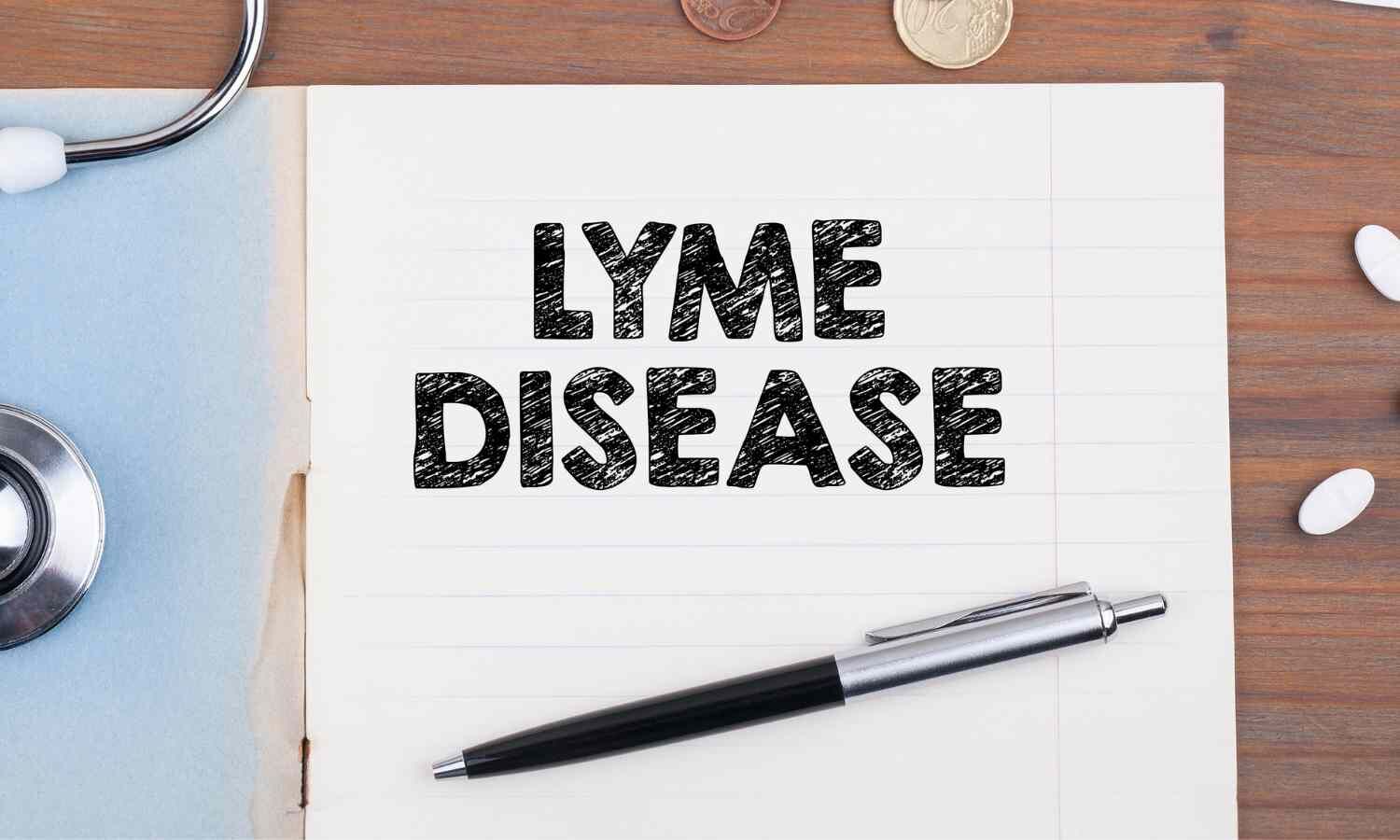August 19, 2025
4 min read
Key takeaways:
- Primary care providers are well positioned to care for patients’ nutritional needs, but some may require more specialized care.
- There is no “one-size fits all” approach to referral, an expert explained.
Although they play different roles in the health care landscape, both primary care providers and specialists can help patients meet their nutritional needs, according to an expert.
It can be difficult for some patients to know just how involved PCPs should be in their nutrition — especially considering the already jam-packed visits — and when it is time to see a specialist. Similarly, PCPs may be unsure when exactly it is right to hand a patient’s nutritional needs off to a colleague.

Healio spoke with Brent Smith, MD, MSc, MLS, FAAFP, a member of the American Academy of Family Physician Board of Directors, to learn about the relationship between PCPs and nutritionists, barriers to specialty care, and more.
Healio: PCPs are already stretched thin — what role should they be playing in a patient’s nutrition?
Smith: Family physicians are able to provide whole-person care, which includes nutrition. The longitudinal relationship we have with our patients allows us to peek behind the curtain and see what lifestyle factors, preexisting conditions or other roadblocks might be standing in the way of a healthy relationship with food and nutrition.
Even if we end up referring a patient to a nutritionist or other dietary specialist, they’re encouraged to bring any questions and concerns to their family doctor first. We can explore solutions together.
Healio: When is it time to refer patients to a nutritionist or dietician? Where is that line when it becomes out of a PCP’s jurisdiction?
Smith: There’s no one-size-fits-all approach to when we suggest a nutritionist for patients. It depends on the patient’s medical history, nutrition goals and current nutritional state. If a patient is struggling with an eating disorder or severe malnutrition, we may bring in a nutritionist or therapist who can provide additional support alongside the care we provide as their family physician.
Some patients never need a referral to a nutritionist. If minor nutritional changes are necessary to stabilize things like blood sugar or maintain a healthy weight, we can work on that, but more complex programs may be better suited with a nutritionist’s support.
Healio: How can PCPs work with nutritionists? Are there any communication barriers to overcome? (Do you share electronic health records, etc.?)
Smith: It is becoming more common to see all parts of a patient’s health care team share information and work on their health together. This varies from case to case, but with the tools and technology available today, health care really is a team effort.
Medicine has an ever-increasing toolbox for dealing with the complexities of our current understanding of disease and expectations for care. There are so many good resources available on the internet, from free to for-purchase, that being able to critique and process them alone is a big lift. Then, in larger hospital systems you have integrated networks and communication that make it even easier to examine data and communicate between specialist physicians, PCPs and other health care providers. Because of this, we can leverage more information and resources than ever, but it also can be increasingly confusing to put that unwieldy amount of information into practice. Increasingly, PCPs serve as that filter/nexus/collector of information to keep the patient’s care centered and on track.
Healio: How can PCPs connect patients to good nutritionists? Are there any resources to help?
Smith: If a patient is looking for a nutritionist, I always try to recommend someone through my professional network. If I don’t have anyone in mind, I ask my colleagues for their recommendations.
There are also great databases online that help patients identify and narrow down choices for specialists. If someone is curious if a specialist is right for them, I always encourage them to reach out to their family physician to get their opinion.
The problem now is that pretty much any information you could want is available online. However, that’s not to say that all information you find online is meaningful, useful or even factually correct. While patients can find diet and nutrition advice from the American Heart Association, the American Diabetic Association, Familydoctor.org, and other reputable resources, they can also find information for fad diets, multilevel marketing nutrition supplement companies and other misinformed or agenda-driven groups. Patients need to be smart about choosing well known and well-respected places for information, such as those major medical organization’s resources, because they have a vested interest in producing well researched and evidence-based information for public consumption.
Healio: What about for patients who need help with nutrition but don’t necessarily need a whole other specialist or can’t afford the service? What resources can PCPs provide to help them stay healthy?
Smith: Family physicians are able to treat a wide range of health concerns, including nutrition and eating habits. Our long-term relationship with patients and our wide breadth of training puts us in a perfect position to address specific concerns, nutrition or otherwise.
For a patient who needs more guidance with their nutrition, I might suggest they see me regularly for check-ins. We can also run routine lab tests to make sure we address any underlying concerns that may be presenting as eating or nutrition struggles.
One of the worst fads I’ve seen recently are ads on social media that brag about this or that organizations “45+ biomarkers that can give unique insight into your health if only you buy our product.” The truth is that most nutritional issues can be identified with a careful history and physical and the basic in office lab work where we examine the function of the liver and the kidneys, blood counts, and your basic vitamins and minerals. Family doctors will get many of these tests as part of routine health maintenance and can add the more specialized ones as part of a focused workup. Treatment and follow-up from there are all based on what the individual patient needs.
Healio: Are there any patient populations PCPs should pay special attention to here (older patients, patients with chronic health issues, patients with eating disorders)? Is there any sort of screening or test that would be beneficial?
Smith: Diabetes is a common area where assistance with nutrition is helpful. But increasingly, patients who are desiring weight loss need nutritional counseling to help them avoid fad and sometimes frankly dangerous diets.
For more information:
Brent Smith, MD, can be reached at primarycare@healio.com.










